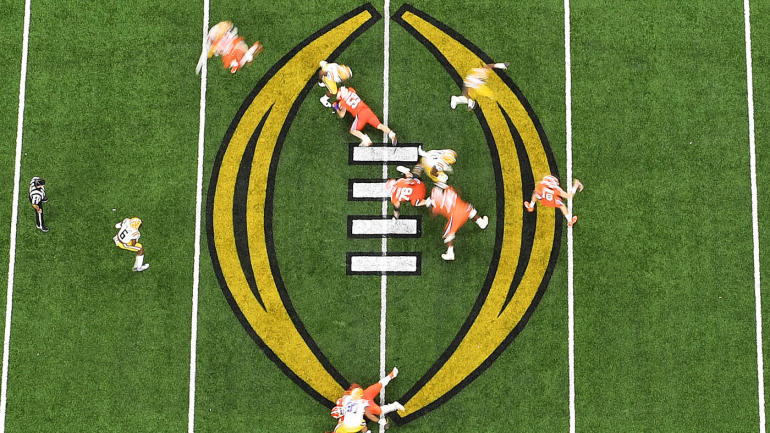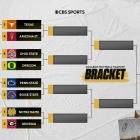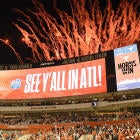
LAS VEGAS -- College Football Playoff expansion must be decided "within the next month or so" if the goal is to get a new model in place by 2024, Mountain West commissioner Craig Thompson said Wednesday.
The 11 members of the CFP Management Committee -- which must approve a model before forwarding it to the CFP Board of Managers for voting purposes -- continues to be deadlocked over structure and access to an expanded playoff with some wondering whether it's even worth it to expand at all.
The committee, which is mostly comprised of the 10 FBS commissioners, meet next on Jan. 10 in Indianapolis. After that, uncertainty looms with logistical problems in aligning bowls and sites in time to play an expanded playoff in 2024.
The current 12-year CFP contract expires after the 2025 season.
"In Year 13, there is no College Football Playoff, so something has to be done," Thompson said during the Learfield Intercollegiate Athletic Forum. "If we do want to expand the College Football Playoff prior to the 12-year term limit, it's going to have to be done here quite readily within the next month or so."
Thompson's words carry weight because he is one of an original four administrators who formally forwarded a 12-team expansion proposal to the board, which comprised of college presidents, in June.
Since then, momentum for expansion has grinded to a halt amid a variety of competing interests. Pac-12 commissioner George Kliavkoff recently suggested the Power Five could move on by themselves with a playoff after the current 12-year contract expires.
It will takes a unanimous vote from all 11 stakeholders on the committee to move forward on expanded playoff access and structure.
"We don't need 11 people to say 'yes' to get to a solution that would be good for college football [after 2025]," Kliavkoff said. "If you look beyond the CFP model, you don't start by saying all of us have to agree [after 2025]. You start by saying … the group that needs to agree on a model … then hopefully invite the rest to join us. It's a different paradigm."
Thompson and at least one Group of Five athletic director have expressed concern that Kliavkoff's statement could lead to the exclusion of those smaller conferences should the contract expire.
This entire conversation must be balanced against possible intervention by Congress concerning monopolistic practices.
"Thirty-five years in Division I, I've heard 'Division IV' a few times," Thompson told CBS Sports regarding a reduction in FBS membership. "I'm not going to respond to that. Be careful what you wish for in some regard. There's purpose and value in 130 football schools. If it's half that number, does the public get as excited about 7-5 and 8-4?"
It's fair to say the CFP stakeholders continued to be fractured. The Big Ten, Pac-12 and Rose Bowl are standing firm on that game being played on Jan. 1 at 5 p.m. ET. That traditional date and time meshes with that morning's Rose Bowl Parade, which some believe is more important than the game itself.
Early on, it was suggested the Rose Bowl could have a permanent spot in the CFP quarterfinals (on or around Jan. 1 as proposed) and be linked with either a Pac-12 or Big Ten team. However, there is still a push to get the game played annually with its traditional partners.
That might require the Rose Bowl being played outside the CFP structure. This year, that would have meant Oregon (second in Pac-12) and Iowa (third in Big Ten) playing in Pasadena, California.
Some combination of the ACC, Big Ten and Pac-12 -- possibly all three -- support the concept of automatic berths for conference champions. The so-called "AQ model" has the possibility of costing a conference an at-large berth if there is an upset in a conference title game. As proposed, a 12-team bracket would be populated by the top six highest-ranked conference champions and six at-large teams.
Among the reasons time is running out: If the expanded playoff is going to debut in 2024, dates must be changed for the existing New Year's Six bowls. In 2024, the semifinals have been assigned to the Orange Bowl and Cotton Bowl on Dec. 28. In 2025, the semifinals are in the Fiesta Bowl and Peach Bowl on Dec. 27.
In a 12-team playoff, two games would have to be added to that timeframe in the quarterfinals.
There are other potential logistical problems of a significant nature that come with changing dates. For example, some stadiums may be occupied by NFL teams (in regular-season or playoff games) or previously scheduled concerts.
There is still a thought that first-round games will be played at campus sites.
As proposed, those first-round games would be played sometime in mid-December with the four quarterfinal games played on or around Jan. 1. The semifinals and CFP National Championship would be played later in January.
The final two championship games in 2024 and 2025 have yet to be awarded.
















